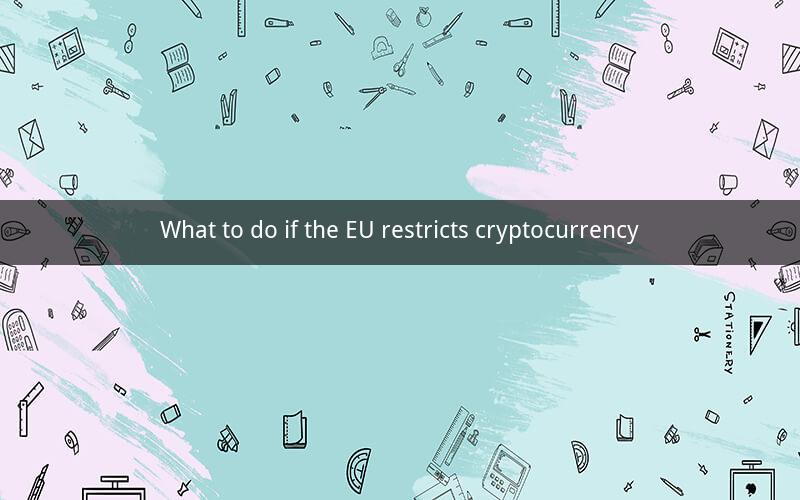
Directory
1. Introduction to the EU and Cryptocurrency
2. The Current Regulatory Landscape of Cryptocurrency in the EU
3. Potential Implications of EU Cryptocurrency Restrictions
4. Strategies for Cryptocurrency Users in the Event of Restrictions
4.1 Diversifying Cryptocurrency Holdings
4.2 Exploring Alternative Jurisdictions
4.3 Utilizing Decentralized Exchanges
4.4 Engaging in Peer-to-Peer Transactions
4.5 Investing in Blockchain-Based Technologies
5. The Role of Governments and Regulatory Bodies
6. Conclusion
Introduction to the EU and Cryptocurrency
The European Union (EU) has been a significant player in the global financial market, and its stance on cryptocurrency has been a topic of great interest. Cryptocurrency, a digital or virtual form of currency, has gained immense popularity over the past decade. However, its regulatory landscape remains a complex issue, with the EU continuously evolving its approach to this emerging asset class.
The Current Regulatory Landscape of Cryptocurrency in the EU
The EU has been working on a comprehensive regulatory framework for cryptocurrency, aiming to address issues such as money laundering, tax evasion, and financial stability. The EU's approach includes the Markets in Crypto-Assets (MiCA) Regulation, which aims to provide a regulatory environment for crypto-assets, including cryptocurrencies.
Potential Implications of EU Cryptocurrency Restrictions
Should the EU impose restrictions on cryptocurrency, the implications could be far-reaching. These restrictions could include limitations on the use of certain cryptocurrencies, stricter Know Your Customer (KYC) and Anti-Money Laundering (AML) requirements, or even a complete ban on certain crypto-assets.
Strategies for Cryptocurrency Users in the Event of Restrictions
Diversifying Cryptocurrency Holdings
One of the most effective strategies for cryptocurrency users in the event of EU restrictions is to diversify their holdings. By spreading investments across various cryptocurrencies, users can mitigate the risk of losing their entire investment in the event of a ban on a particular asset.
Exploring Alternative Jurisdictions
Cryptocurrency users may consider exploring alternative jurisdictions with more favorable regulatory environments. Countries like Switzerland, Liechtenstein, and Singapore have been known for their crypto-friendly policies.
Utilizing Decentralized Exchanges
Decentralized exchanges (DEXs) offer a way for users to trade cryptocurrencies without relying on centralized platforms, which may be subject to stricter regulations. DEXs operate on blockchain technology, providing a level of anonymity and security that centralized exchanges may not offer.
Engaging in Peer-to-Peer Transactions
Peer-to-peer (P2P) transactions allow users to exchange cryptocurrencies directly with each other, bypassing traditional financial intermediaries. This method can be more discreet and less susceptible to regulatory scrutiny.
Investing in Blockchain-Based Technologies
Investing in blockchain-based technologies can be a long-term strategy for cryptocurrency users. By supporting projects that are developing innovative solutions within the blockchain space, users can contribute to the growth of the industry and potentially benefit from the rise of new technologies.
The Role of Governments and Regulatory Bodies
Governments and regulatory bodies play a crucial role in shaping the regulatory landscape of cryptocurrency. They need to strike a balance between protecting consumers and businesses and fostering innovation within the industry. Effective regulation can help prevent financial crimes while also ensuring the growth of the cryptocurrency market.
Conclusion
The potential for EU restrictions on cryptocurrency is a concern for many users and investors. By diversifying their holdings, exploring alternative jurisdictions, utilizing decentralized exchanges, engaging in P2P transactions, and investing in blockchain-based technologies, users can mitigate the risks associated with such restrictions. Governments and regulatory bodies must also work together to create a regulatory framework that promotes innovation while protecting consumers and the financial system.
Questions and Answers
1. What is the primary goal of the EU's MiCA Regulation?
- The primary goal of the EU's MiCA Regulation is to provide a comprehensive regulatory framework for crypto-assets, including cryptocurrencies, to address issues such as money laundering and tax evasion.
2. How can users diversify their cryptocurrency holdings?
- Users can diversify their holdings by investing in a variety of cryptocurrencies, spreading their investments across different asset classes and market segments.
3. What are the potential risks of using decentralized exchanges?
- The potential risks of using decentralized exchanges include security vulnerabilities, lack of regulatory oversight, and the complexity of the platforms.
4. How can governments and regulatory bodies promote innovation in the cryptocurrency industry?
- Governments and regulatory bodies can promote innovation by creating a supportive regulatory environment that encourages the development of new technologies while ensuring consumer protection and financial stability.
5. What is the difference between a centralized and a decentralized exchange?
- A centralized exchange is a platform where users trade cryptocurrencies through a central authority, while a decentralized exchange operates on blockchain technology, allowing users to trade directly with each other.
6. How can P2P transactions help users avoid regulatory scrutiny?
- P2P transactions can help users avoid regulatory scrutiny by allowing direct peer-to-peer exchanges, which may be less susceptible to monitoring by financial authorities.
7. What are some of the challenges faced by blockchain-based technologies?
- Some of the challenges faced by blockchain-based technologies include scalability issues, regulatory uncertainty, and the need for widespread adoption by businesses and consumers.
8. How can users stay informed about the latest developments in cryptocurrency regulation?
- Users can stay informed about the latest developments in cryptocurrency regulation by following reputable news sources, attending industry conferences, and joining online forums.
9. What is the role of blockchain in the financial industry?
- Blockchain technology has the potential to revolutionize the financial industry by providing secure, transparent, and efficient transactions, reducing the need for intermediaries.
10. How can individuals protect themselves from cryptocurrency scams?
- Individuals can protect themselves from cryptocurrency scams by conducting thorough research on investment opportunities, using secure wallets, and being wary of unsolicited investment offers.